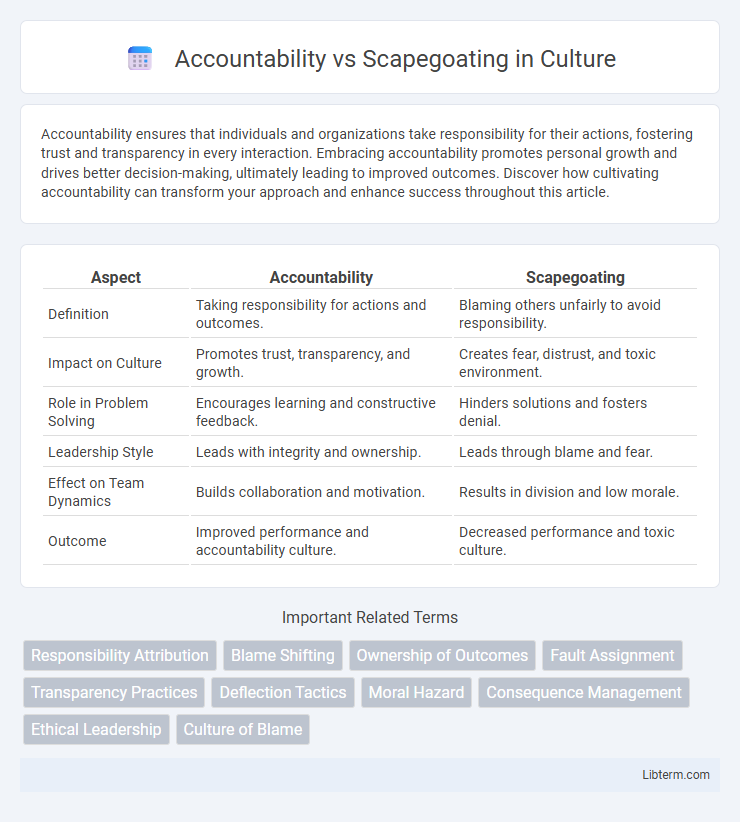Accountability ensures that individuals and organizations take responsibility for their actions, fostering trust and transparency in every interaction. Embracing accountability promotes personal growth and drives better decision-making, ultimately leading to improved outcomes. Discover how cultivating accountability can transform your approach and enhance success throughout this article.
Table of Comparison
| Aspect | Accountability | Scapegoating |
|---|---|---|
| Definition | Taking responsibility for actions and outcomes. | Blaming others unfairly to avoid responsibility. |
| Impact on Culture | Promotes trust, transparency, and growth. | Creates fear, distrust, and toxic environment. |
| Role in Problem Solving | Encourages learning and constructive feedback. | Hinders solutions and fosters denial. |
| Leadership Style | Leads with integrity and ownership. | Leads through blame and fear. |
| Effect on Team Dynamics | Builds collaboration and motivation. | Results in division and low morale. |
| Outcome | Improved performance and accountability culture. | Decreased performance and toxic culture. |
Defining Accountability and Scapegoating
Accountability involves taking responsibility for actions and outcomes with transparency and a commitment to improvement, reinforcing trust and ethical behavior within organizations. Scapegoating occurs when individuals or groups are unfairly blamed for problems, deflecting responsibility and obstructing effective problem-solving. Understanding these concepts is critical for fostering a culture of fairness and continuous development.
Key Differences Between Accountability and Scapegoating
Accountability involves taking responsibility for actions and outcomes, emphasizing learning and growth, while scapegoating unfairly blames an individual or group to deflect responsibility and avoid addressing the root cause. Key differences include accountability fostering transparency, constructive feedback, and problem-solving, whereas scapegoating promotes blame-shifting, denial, and toxicity within teams or organizations. Accountability supports ethical leadership and trust-building, contrasting with scapegoating's tendency to damage morale and hinder effective decision-making.
The Importance of True Accountability in Organizations
True accountability in organizations fosters a culture of responsibility by encouraging transparent communication, honest self-assessment, and proactive problem-solving. It contrasts sharply with scapegoating, which undermines trust, damages morale, and hinders organizational growth by unfairly blaming individuals for systemic issues. Emphasizing genuine accountability drives continuous improvement and strengthens team cohesion, ultimately enhancing overall organizational performance.
Common Signs of Scapegoating in the Workplace
Common signs of scapegoating in the workplace include unjustly blaming a single employee for team failures, isolating the targeted individual from collaborative projects, and consistent criticism that lacks constructive feedback. This behavior often manifests through unfair performance evaluations and exclusion from decision-making processes, undermining trust and morale. Recognizing these patterns is essential to fostering a culture of accountability and preventing toxic workplace dynamics.
Psychological Impacts of Scapegoating
Scapegoating triggers psychological distress by fostering feelings of shame, helplessness, and social isolation in the targeted individual. This process disrupts healthy emotional development and self-esteem, often leading to anxiety, depression, and long-term trauma. Accountability, in contrast, promotes personal growth and psychological resilience by encouraging responsibility without blame.
Building a Culture of Accountability
Building a culture of accountability requires clear communication of responsibilities and consistent enforcement of expectations to foster trust and ownership among team members. Emphasizing transparency and constructive feedback helps prevent scapegoating by addressing issues collaboratively rather than assigning blame. Leaders play a crucial role by modeling accountability and encouraging an environment where mistakes are seen as learning opportunities for growth.
Leadership’s Role in Preventing Scapegoating
Effective leadership fosters accountability by establishing clear expectations and promoting a culture of transparency where team members feel safe to admit mistakes. Leaders prevent scapegoating by addressing issues objectively, focusing on problem-solving rather than assigning blame, thereby maintaining trust and collaboration. Strong leadership encourages shared responsibility, reducing the risk of unfairly targeting individuals and enhancing overall organizational resilience.
Strategies for Shifting from Blame to Responsibility
Effective strategies for shifting from scapegoating to accountability include fostering a transparent communication culture where mistakes are openly discussed without fear of punishment. Implementing clear role definitions and performance metrics helps individuals understand their responsibilities and reduces the tendency to deflect blame. Encouraging collaborative problem-solving and providing training in conflict resolution further promote ownership and collective accountability within teams.
Case Studies: Accountability vs Scapegoating in Action
Case studies reveal clear distinctions between accountability and scapegoating in organizational failures. The Boeing 737 Max crashes illustrate a failure in accountability, where corporate decisions prioritized profits over safety, leading to systematic oversight lapses. Conversely, the Volkswagen emissions scandal demonstrates scapegoating, as the company initially blamed isolated engineers instead of addressing the broader corporate culture that enabled unethical practices.
Long-Term Benefits of Embracing Accountability
Embracing accountability cultivates a culture of trust and continuous improvement, essential for sustainable organizational growth. This approach encourages transparent communication and robust problem-solving, reducing recurring errors and fostering innovation. Long-term benefits include enhanced employee morale, stronger leadership credibility, and improved overall performance.
Accountability Infographic

 libterm.com
libterm.com